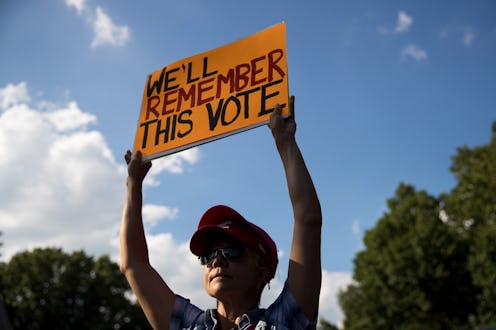News
Here's Exactly How The GOP Tax Bill Targets The Most Vulnerable Americans

In the early hours of the Saturday morning, the Senate passed a bill that will deliver sweeping changes to the American tax code. Every Republican except for Bob Corker voted yes on the legislation, while Democratic senators all came out against it. Now that the tax bill is almost certain to be signed into law, legislators will have to deal with its impacts on their constituents — and many experts say that sick and elderly Americans are likely to suffer the most.
The bill, which is more than 429 pages long, was given to representatives mere hours before the Senate was set to vote on it. Tucked into page 94 of the tax bill is a decision that will likely deliver huge changes to the U.S. health care system — the elimination of the individual mandate that requires most Americans to purchase health care plans. President Trump has called the individual mandate "highly unpopular,” and efforts to eliminate it have been largely supported by Republicans.
Republican senators Ted Cruz, Rand Paul, and Tom Cotton led the push to include the elimination of the individual mandate in the tax bill. Cotton, a strong supporter of the president, argued that repealing the mandate would pay for tax cuts for working families, and protect these individuals from being fined "for not being able to afford insurance that Obamacare made unaffordable in the first place."
Emily Gee, a health care economist with the Center For American Progress, says the decision to eliminate the individual mandate is part of Republicans' nearly decade-long struggle to dismantle Obamacare. Without an incentive to purchase plans, healthier Americans will enroll in health care programs, and premiums will go up. The nonpartisan Congressional Budget Office estimates that 13 million could lose health insurance over the next 10 years as a result of the decision, saving the government more than $300 billion.
"This is really about responsibility," Gee tells Bustle. "Everyone has a responsibility to get covered, and insurance markets work best if there are both sick and healthy people in the insurance pool," adding that these health care costs are not imagined — someone has to pay for them at the end of the day. Amy Siskind, the president of the New Agenda, summed up the elimination of the individual mandate as "an Obamacare repeal."
Even Republican senators like Susan Collins and John McCain — who previously resisted efforts from the GOP to gut Obamacare — came around to vote yes on the health care bill. Sen. Lisa Murkowski, who previously voted no on her party's health care bills, voted yes on this tax bill, likely because it authorizes drilling on Alaska's Arctic National Wildlife Refuge.
The elimination of the individual mandate is not the only part of the tax bill that will affect some of the country's most vulnerable citizens. For senior citizens, this bill could spell disaster. Because it would raise the deficit to about $1.5 trillion, a number of cuts to government programs will be automatically triggered, notably Medicare, which provides health care treatment for Americans 65 and older.
Cuts to Medicare will total about $25 billion over the next fiscal year alone. In the long term, the deficit will also force cuts to Medicaid and Social Security, two other programs that elderly people rely on heavily, in addition to low-income and disabled individuals.
The American Association of Retired Persons (AARP) came out against the bill, noting in a letter to the Senate that in addition to gutting funding from programs that affect elderly people, the bill could cause tax hikes for millions of senior citizens over the next ten years, writing that "even today’s 65+ as well as those who turn 65 by 2027 who benefit initially may end up paying higher and ever increasing taxes soon thereafter."
The effects of the tax bill might not be visible overnight, but it is clear from experts' analysis that vulnerable Americans — especially the sick and the elderly — could feel its effects long into the next decade.